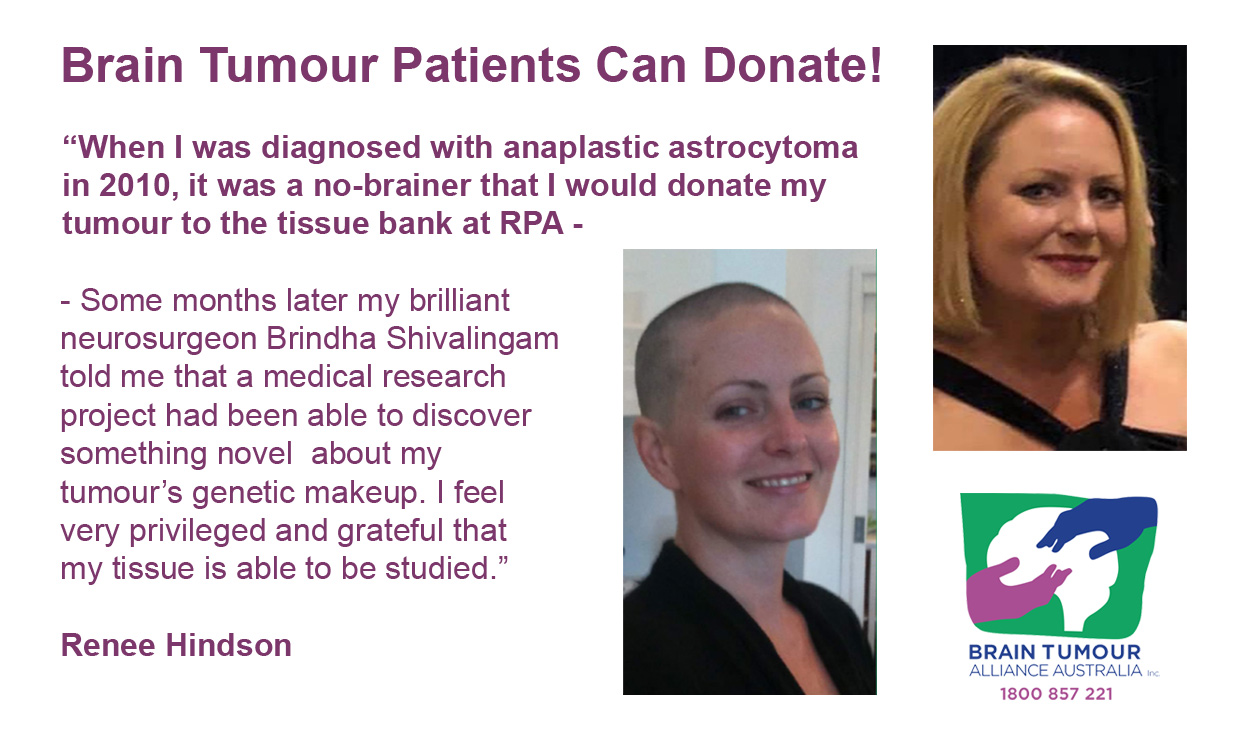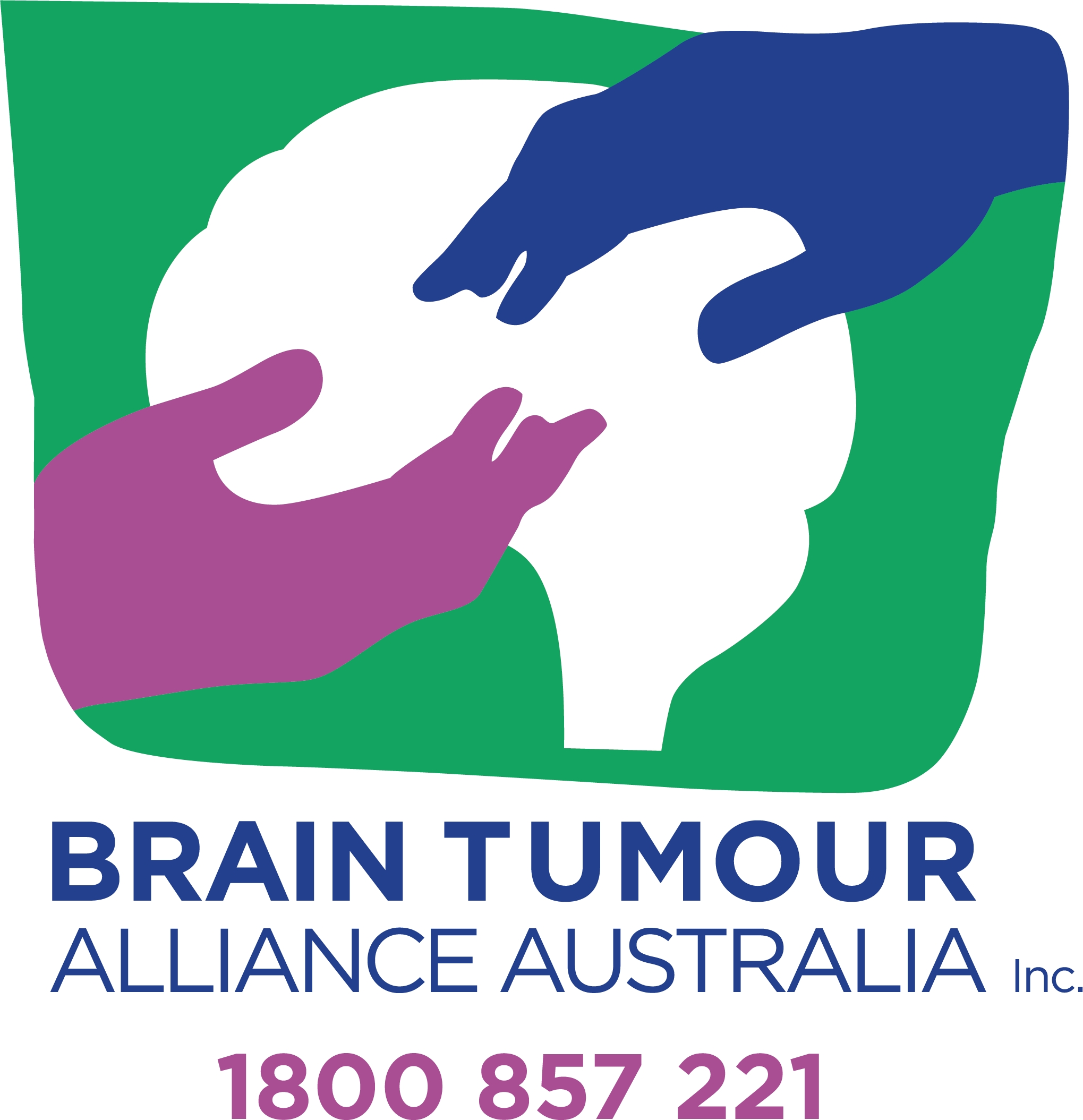

When I was diagnosed with anaplastic astrocytoma in 2010, it was a no-brainer that I would donate my tumour to the tissue bank at RPA. Some months later my brilliant neurosurgeon Brindha Shivalingam told me that a medical research project had been able to discover something novel about my tumour’s genetic makeup. I feel very privileged and grateful that my tissue is able to be studied.
A year later I saw a Red Cross blood donation van at my local shops and was curious – am I an eligible blood donor?
In June 2018 I saw on the news - Queensland Health revealed that four patients received donor tissue from a patient who had brain cancer. The revelation made national news when it was announced during a review into the state’s trouble-plagued heart valve bank. The donor had gliosarcoma, a rare subset of glioblastoma, while all four patients - three babies under 12 months and a young adult - received heart valve tissue. The media was up in arms!
This led me to investigate and clarify the circumstances within which brain tumour patients can donate blood, tissue and organs. This is the result of my findings:
Organ Donation
Almost anyone can donate their organs and tissue. While age and medical history will be considered, people shouldn’t assume they are too old or not healthy enough. There’s every chance that some of their organs and tissues may be suitable for donation. It is up to medical staff to determine at the time if a person is able to donate organs or tissues.
Having a primary brain tumour doesn’t necessary mean you can’t donate. Doctors will decide, when necessary, whether you are a suitable donor. Therefore, if you wish to donate, it is still worth registering your decision.
In summary, primary CNS tumours do not contraindicate organ donation. Cerebral lymphoma and secondary malignancy absolutely contraindicate donation. In each case, the risk to the potential recipient of not receiving a transplant should be weighed against the risk of transmission of donor malignancy. Based on reported data, the risk of transmission is likely to be low, even with high-grade malignancy. Informed consent is required from the recipient and an estimate of the risk of transmission can be based on the SaBTO (Advisory Committee on the Safety of Blood, Tissues and Organs) Guidelines. Craniotomy or other breach of the blood brain barrier does not contraindicate donation, though a ventriculosystemic shunt may increase the risk of transmission slightly. During the evaluation of a donor with a cerebral tumour, the following should occur during the donor procedure: a thorough thoracic and abdominal exploration with visualisation and palpation of organs and nodes and direct inspection of the cervical lymph nodes and craniotomy site (if present).
Source: Transplantation Society of Australia and New Zealand: Clinical Guidelines for Organ Transplantation from Deceased Donors, 2016
If you wish to become a donor, you are encouraged to register your decision on the Australian Organ Donor Register. It is important that you discuss your donation decision with your next of kin, and that you ask and know their donation decision. Families play a crucial role in the donation process because they are asked to confirm the donation decision of their loved one. The family will be involved in each step of the donation process and be asked to provide vital health information – even if you have registered your decision.
It’s easy to join the Donor Register and it takes less than two minutes. To register visit www.donatelife.gov. au/decide - all you need is your Medicare Card number.
Blood Donation
If you are 18-70 years old, healthy and weigh over 55kg, you may be eligible to donate blood. Other criteria for donation include health, lifestyle, travel and medication.
You can check your eligibility here: https://www.lifeblood.com.au/blood/eligibility
Cancer and Blood Donation
In most cases, you can donate again if you remain free of cancer five years after completing treatment. This is to protect your health by ensuring, as far as possible, that the cancer is gone and will not recur. For some cancers (or pre-cancers) of the skin, cervix, prostate, or ductal carcinoma in-situ (DCIS) of the breast, you may be eligible to donate as soon as treatment is complete. However, if you have a history of leukemia, lymphoma and myeloma, which involve the blood production system, you can never donate blood. This is to protect your health and the health of patients who receive donated blood.
People who have or have had solid cancers such as brain tumours are not able to donate until five years after the completion of treatment, provided there has been no relapse or recurrence.
Source: Australian Red Cross Blood Service
Don’t be disappointed if you cannot donate because there are other ways you can help. You can spread the word on social media, organise a group to donate blood or become a member or volunteer at the Australian Red Cross Blood Service.
Hair Donation
One of the most distressing side effects of cancer treatments is hair loss. It may occur to some to donate your precious tresses or to hold a shave-fora-cure fundraising event.
There are a number of organisations and businesses in Australia that accept human hair donations. Variety – the Children’s Charity – requires unprocessed (colour treated) hair that is 35cm or longer and all-grey hair is acceptable. Each organisation has a differing set of guidelines for what they will accept so stop before you crop – check the requirements!
Brain and Brain Tumour Donation
Biobanks collect and store various types of clinical samples such as blood and tissue and associated data from consenting donors for use in research. Clinical samples are collected from patients during surgery for diagnosis and treatment. Any material not required for diagnosis can be stored in a biobank. Researchers with ethically approved projects can then apply to access samples and associated de-identified data for research. There are a number of biobanks around Australia that collect and store biospecimens and data from patients who have been diagnosed with brain cancer to support research into diagnosis, treatment and improved clinical management of brain cancer patients. Any adult or child who has been diagnosed with brain cancer can participate in biobanking.
If you would like to donate clinical samples your first step would be to speak with your treating clinician.
If you require further information, please contact Brain Cancer Biobanking Australia here.
Renee Hindson
To return to the BTAA homepage please click here.
[This article was first published in the Official BTAA Magazine – October 2019 Edition]

